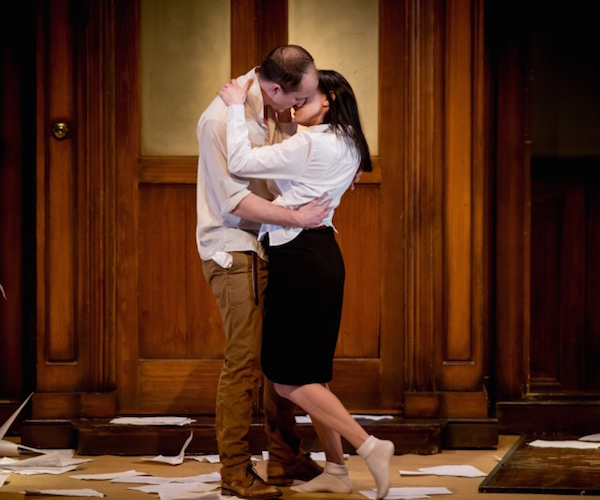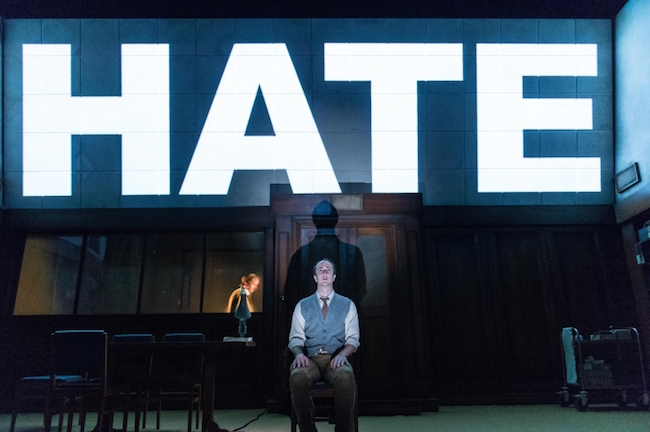Theater Review: “1984” — It’s Later Than You Think
1984‘s theatrical vision of authoritarianism in action is not for the faint of heart.
1984 by George Orwell. An adaptation of the novel by Robert Icke and Duncan Macmillan. Directed by Icke and Macmillan. Presented by the American Repertory Theater in association with Headlong, Almeida Theatre, and Nottingham Playhouse at the Loeb Drama Center, Cambridge, MA, through March 6.

Matthew Spencer and Hara Yannas in “1984.” Photo: Ben Gibbs.
By Jess Viator
It is astounding that a book written decades ago about a terrifyingly potential future remains so frighteningly relevant to our current dystopian fears. A chilling warning about governmental overreach and the demolition of individuals’ privacy, George Orwell’s 1984 stands as an iconic text, spookily prescient. The book has long been on American high school students’ required reading lists, so it is not surprising that its paranoia seems almost inevitable to us. Now that we are all carrying portable telescreens in our pockets, who is shocked that the authorities want unfettered access to what’s stored in them? Perhaps the Headlong/Almeida Theatre/Nottingham Playhouse production (brought here by the American Repertory Theater), should invite the FBI to watch its extremely effective stage adaptation of 1984. Though I wouldn’t bet that hearts and minds would be changed.
The story: Winston lives in a uber-mechanized future Britain where the government (The Party) has complete access to individuals’ lives, watching them 24/7 via two-way tele-screens. People are forbidden their basic human rights (free thought, free will, freedom of expression, love); the population’s obedience is maintained through fear and the imminent threat of torture and death. Winston secretly hates The Party and Big Brother (a Thoughtcrime) and struggles to hide it. But then he meets Julia, and they fall in love (a Sexcrime), and they decide to join the Resistance (a… crime). Though they know that their discovery is inevitable, they vow to never betray each other. But they do.
Adapters/directors Robert Icke and Duncan Macmillan’s concept for 1984 astutely toys with the audience’s perspective, first putting us eye-to-eye with Winston, the watched, and then turning us into the sadistic voyeurs. To accomplish this twist, they must at times make us feel as confused and as alienated as Winston does. Multiple methods are employed: a bombardment of our senses with bright lights flashed in our faces, and loud booms; characters who move weirdly and act unnaturally; a storyline that is not always linear and doesn’t bother with much exposition.
The script and direction of 1984 are calibrated to deliver a finely tuned, supremely disorienting experience. Icke and Macmillan have come up with a vocabulary made up of precisely choreographed movements and gestures — with an emphasis on repetition and altering tempos — to visually depict the hell of 1984. Every day is exactly the same; every movement carefully controlled; every conversation is strategically bland; every look guarded; and every person is tense to the breaking point. The production never parades the tyrannical image of Big Brother—it doesn’t need to—the movement work alone suggests how hyperaware each character is of being constantly watched and threatened. The performers’ bodies reflect the contortions generated by society’s psychological/political pressures.
Kudos must go to Chloe Lamford’s ingenious set design, as well as the use of cameras and screens: the audience is agilely flipped from observed to observer. Initially, the setting is one room, furnished in a slightly dingy, post-war British aesthetic, with lots of dark wood and yellow-tinted glass panes. This space is versatile: it serves as Winston’s apartment, the Ministry of Truth, a train station, and the antique shop where he rents his secret room. Once Winston and Julia enter their hideaway, we see them on the giant telescreen that stretches across the stage. At this point some neatly theatrical Doublethink is served up: we are at once in Winston’s shoes — empathizing with him, experiencing his disorientation and fear — and also the oh-so-prying eyes of the ever-present Big Brother, eagerly watching Winston and Julia’s every action.
Once our lovebirds are caught, amid a confusing whirlwind of guns and shouting and cameras and darkness and voices and screaming, the set is torn down and resurrected into the dreaded Room 101. Everything, everyone is coated in creepy white plastic — except Winston and his torturer. Yes, there is a visceral, bloody, unrestrained torture scene. Watching authoritarianism in action is not for the faint of heart.

Matthew Spencer in “1984.” Photo: Manuel Harlan.
The actors work together like clockwork, each of them performing their roles in perfect harmony with each other. They draw on a stylized method of acting that somehow manages to be concrete rather than abstract. There is a precision and intensity to the performers contorted physicality that is utterly captivating. Matthew Spenser as Winston manages to pull off an impressive emotional arc, from confused duckling to nihilistic lover and then mutilated wretch — but each of his adroit scene-mates gives him plenty of dramatic assistance. When Winston and Julia, played by Hara Yannas, are finally alone together, when they finally release all of their tightly wound-up tension, the moment of unhinged anarchy is electrifying. Spenser’s portrait of the tortured Winston makes the biggest splash (he has our rooting interest), but Tim Dutton as O’Brien, the torturer, powerfully drives the final scene; he is cold and calm and alarmingly staid as he convinces Winston that 2+2=5.
The gruesome wind-up constitutes my principle criticism of the production: the torture scene is a little too effective. The soul-shredding is pressed to the point that it is hard to watch; the audience identifies with Winston, so we vicariously experience his brutal reprograming. The brainwashing goes on and on and it is draining; at the end of it, you feel like you have been spiritually broken. This visceral fusion of performance/audience is amazing — but should audience members spend the last 10 minutes of a production wishing “I need this to be over, now”? (I suspect their answer would be, “yes.”)
Still, Icke and Macmillan leave us with a glimmer of hope. In the beginning of their production they have created a meta-narrative featuring a panel of academics whose sudden appearance is as shocking to us as it seems to be to Winston. The lights suddenly go dark, and then just as suddenly they come back on. There are people where there were no people before. They discuss Winston’s diary (while they eerily stare at him) as if it were some sort of strange archeological find.
This panel from the future was inspired by Orwell’s appendix. Icke and Macmillan point out in the program that 1984 contains a footnote, in the past tense, that leads to the volume’s appendix, which explains the tenets and uses of Newspeak. The logical implication is that there must be a time, post-Big Brother, when free thought and free will is no longer repressed. There must have been someone who thought that Winston’s narrative was important enough to warrant an appendix. All is utter bleakness, aside from a footnote’s note of optimism — a deliciously Orwellian gesture.
Jess Viator is an emerging independent theater director, an occasional stage manager, and a lapsed playwright. She has a BA in theater performance, and recently completed a master’s degree in theatre studies from the University of Dundee in Scotland.
Tagged: 1984, American Repertory Theater, Big Brother, Duncan Macmillan, George Orwell, Jess Viator, Matthew Spencer
